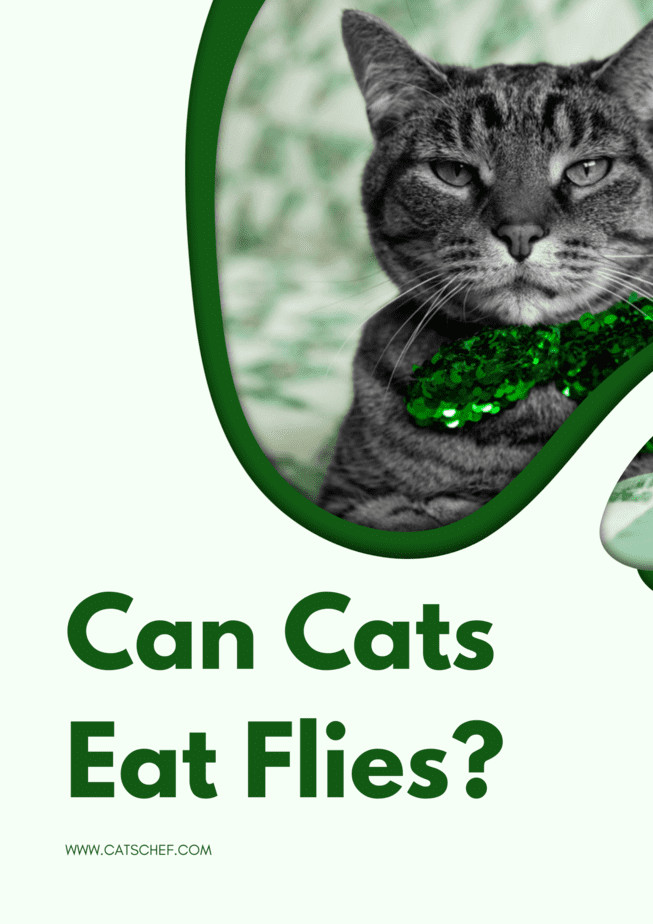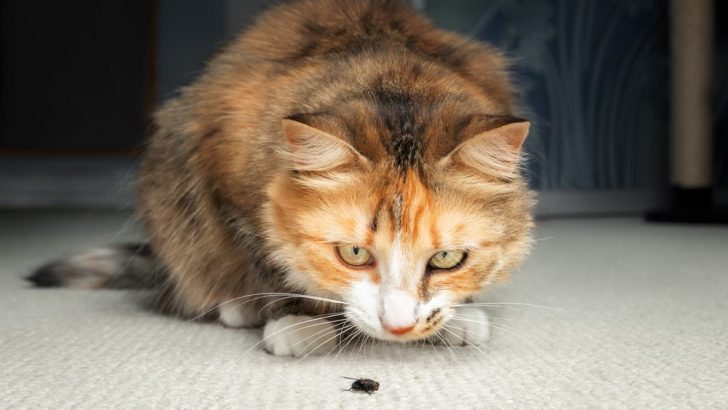“In a minute, I‘m gonna need some kitty kibble, lamb, or chicken, to chunk me up…” As Lizzo once said (well, she said something along these lines), cats are always looking for ways to get their paws on cat foods, cat treats, human foods, and things that aren’t food AT ALL. Can cats eat flies?
And, you‘ve caught your four-legged friend hunting for insects on more than one occasion. You’ve been COMPLETELY grossed out by the fact that she keeps insisting on munching on flies, grasshoppers, WASPS, and everything else she can catch.
Come on, you’ve been feeding her carefully crafted (feel free to read that as ”expensive”) cat food, and she repays you by bringing a FULL BLOWN cockroach onto your bed!? By playing with spiders you’re so deathly afraid of (she could at least kills them and save you the heart attack)?!
By munching on flies right NEXT TO YOU while you’re trying to impress your date with your culinary skills? Believe it or not, we’ve all been there and we’ve all witnessed our cat’s undying love for everything that moves and wiggles around the room.
But, can cats eat insects with no repercussions? Can cats eat flies without contracting some sort of disease? According to our friends over at the ASPCA (American Society for the Prevention of Cruelty to Animals), cats can eat flies.
We can’t vouch for other insects (more on that later in the article), but we can say with certainty that flies are some of the least dangerous insects your cat can scoff down. That’s not to say that there are no dangers to eating flies on a regular, though.
So, can cats eat flies?
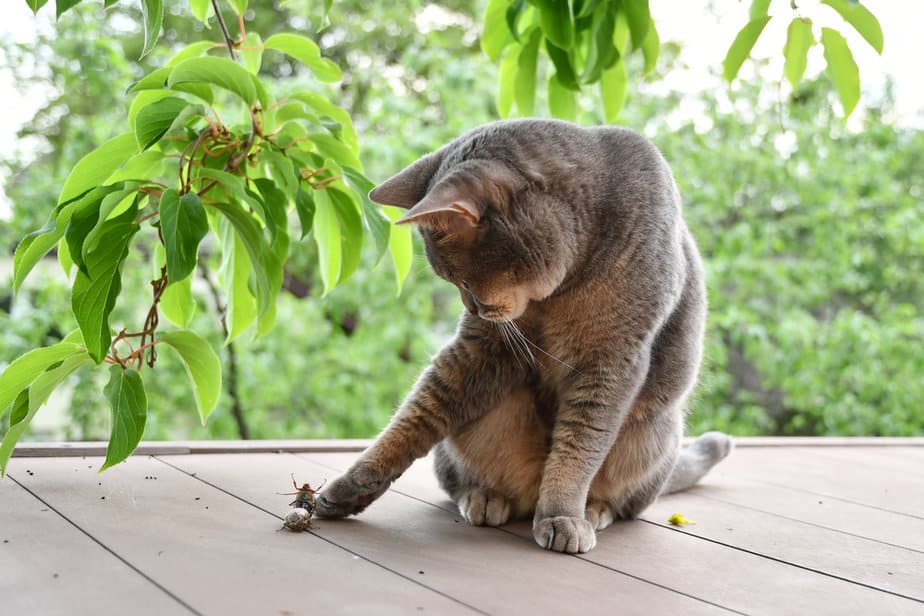
Yes, flies are pretty gross. Yes, your furry friend LOVES to play with them, catch them, and eat them. And yes, cats can eat flies the same way they can eat a bunch of other bugs. And don’t worry, you’re not the only cat owner that has a tough time trying to stomach these things.
Let’s go back to the beginning of time; why don’t we? Cats are carnivores (have been forever) which means they require a bunch of meat, animal protein, and animal-sourced nutrients to survive. They don’t require fruits, veggies, and grains the same way humans do.
They don’t possess the enzymes necessary for their digestive systems to break down and process most foods humans eat. And they have pretty sensitive stomachs (which makes you think they wouldn’t be able to break down and digest bugs, but they are).
Wild cats spend most of their day surrounded by different bugs, insects, and other gross wiggling things. Your not-so-wild cat doesn’t do that, but she certainly does have a soft spot for houseflies, grasshoppers, and botflies. Yes, domestic cats can be pretty gross regardless of their purrincess treatment.
But, there’s always a but when your pet cat gets a wild cat complex and tries to act tough. Sure, flies aren’t the worst thing she can munch on, but they can be pretty dangerous when you remember they can carry feces, bacteria, pesticides (insecticides), pathogens, and parasites.
Your cat’s pretty tough, but we can‘t forget that these pesky passengers can cause serious harm to your cat’s health. Keep reading to learn everything you need to know about the “cats versus flies“ situation and don’t shy away from consulting with your vet.
Why would your cat want to eat a fly?
“Why does my cat keep eating flies?! She‘s provided with A BUNCH of cat kibble, cat food, and cat treats on a regular, but she keeps running after flies, throwing her paws in the air, and trying to catch them as if she hasn‘t scoffed down an entire bowl of Meow Mix THREE SECONDS AGO!“
Why do cats eat flies?! You’re not the only one who finds their cat’s behavior slightly odd; we can tell you that much. Cats are curious creatures (the whole “curiosity killed the cat” shebang!). You can‘t blame your cat for wanting to explore her possibilities and catch the wiggle on the wall.
Cats are hunters (have been since the dawn of time), and just because you can’t imagine your precious purrincess chasing after her prey doesn’t mean she’s not capable of doing that. She feels a natural draw towards chasing after everything that moves and wiggles.
That moment when her eyes become dark and wide (and super adorable)? That happens to pretty much every cat (yes, even the wild ones) when they’re getting ready to attack. Whenever they catch their prey (in this case, the fly), they act on their instincts and take a bite.
And flies happen to be A LOT of fun for your four-legged friend! When they fly around her head, settle on and leap off the kitchen counter whenever she approaches, they’re teasing her. That’s what she thinks, at least (and she also thinks they’re having fun).
That’s why catching flies can take HOURS for your cat. She’s not slow, she’s just taking her time playing with her food (one thing our moms never let us do, right?), and enjoying the hunt. She can even use the time to teach her kittens how to hunt (we’ve seen that before, haven’t we?).
What happens when your cat eats a fly?
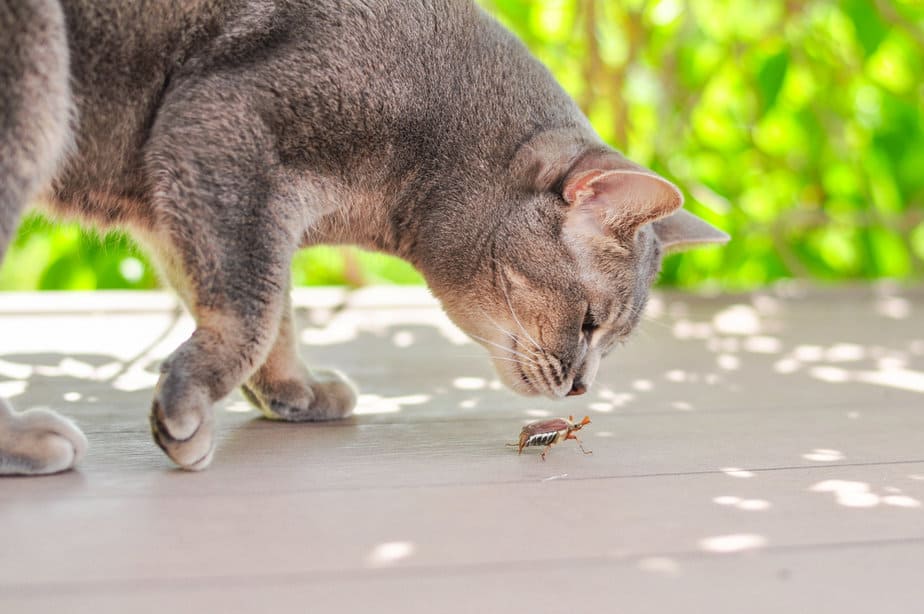
Cats can eat flies, correct? Nothing bad should happen to your furry friend when she scoffs down a couple of flies that have been having WAY TOO MUCH FUN on your kitchen table, right?
Believe it or not, chasing after flies (and other insects) happens to be one of the healthiest activities your cat can do. Your cat (probably) spends most of her day lounging around the house and munching on cat foods and cat treats you place in front of her so she doesn’t have to move.
Spending that much time doing NOTHING can make your cat sick because she needs to move her body to get stronger and healthier. Chunky cats might look adorable because of the fluff, but they can’t live a happy and healthy life when they can’t move their bodies.
Chasing after flies can help your furry friend improve her paw-eye coordination, boost her immune system, maintain the proper function of her nervous system, and stimulate her brain function. She’s saying goodbye to her health problems by munching on grossly delicious food; who wouldn’t want that?!
But, we can‘t have the good without the bad. So, munching on flies doesn’t come without the risks of contracting different diseases, getting infected with bacteria and parasites, and developing maggots and fleas. How can you combat that?
Give your vet a visit and make sure your cat’s immunization, deworming, and vaccination against fleas are up-to-date. You can’t prevent your cat from enjoying an occasional fly or two, but you can prevent her (or at least try) from contracting parasitic and bacterial infections.
Your feline friend’s well-being should be your number one priority. So, here’s what you need to know about the benefits and risks of turning a blind eye whenever she sets off on another hunting mission.
What are the benefits of eating flies?
Cats LOVE eating flies for a reason, don’t you think? Cats know exactly what they’re doing most of the time and they’re completely aware of what works for them.
They eat what and whenever they want to, they cuddle you and give you kisses when they want to, and say “No” when they aren’t comfortable. They scratch you every time you break the rules and overstep their boundaries (as they should.)
They’re perfectly capable of deciding whether they can devour that fly they spend the last half an hour chasing around the house. And they’re completely right because that fly can provide them with a bunch of protein, vitamins, and minerals that can do wonders for their health.
That’s right, flies are packed with nutrients that make them a TOLERABLE treat for your four-legged friend.
1. Protein
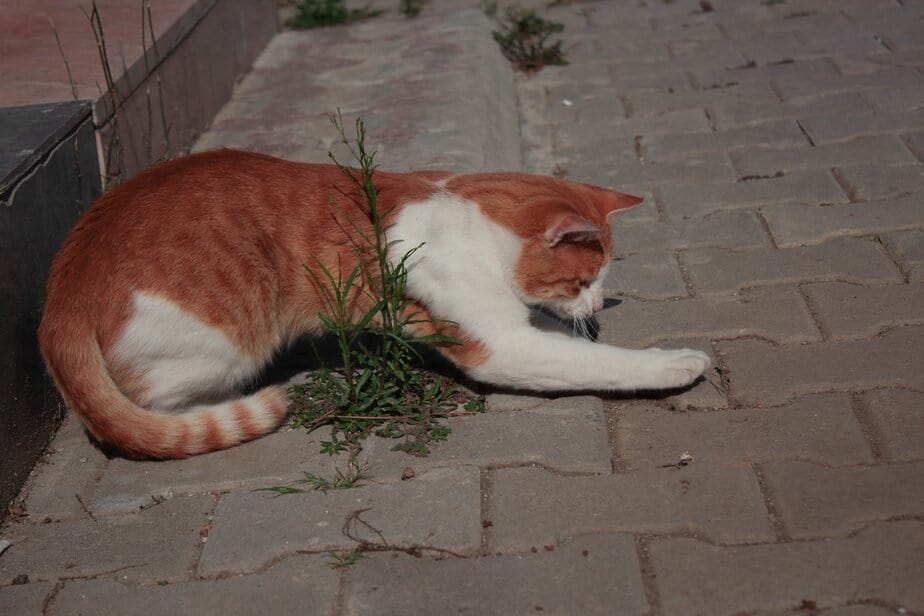
Who’s surprised that bugs contain a bunch of protein? Then, can cats eat flies and enjoy all of the protein without any consequences?
Well, a fly’s larvae are 45% protein (gross, but interesting), and a fly’s eggs are around 43%. Cats THRIVE on animal protein (and yes, bug protein counts) because protein does wonders for their health.
First things first, cats need protein for energy. Cats store protein within their bodies, turn it into energy, and use it to run around the house at 3 AM while their humans are trying to sleep. Humans do the same with carbohydrates, but cats are on a strict Keto diet so they’re stuck with protein.
On the other hand, protein provides bulk to help food move through a cat’s digestive tract. Protein retains the water your cat drinks throughout the day which, in turn, helps prevent digestive problems such as diarrhea and constipation.
One or two flies a day can provide your furry friend with a healthy, protein-packed pick-me-up. Don’t get me wrong, flies shouldn’t be a regular part of your cat’s diet. But, they’re pretty handy when there’s nothing else to scoff down (and the beast’s getting hungry).
2. Vitamins
You read that right, you can benefit from quite a few vitamins when you munch on a fly! Vitamin B6, vitamin B9, and vitamin B12 – that’s a lot of Bs, but these vitamins get a straight A+ from your four-legged friend.
And what are the benefits of getting B vitamins from animal sources (or bug sources)? B vitamins are essential for your cat‘s skin and hair (Gigi Hadid, who?), giving a boost to her immune system, maintaining the proper function of her digestive system, and stimulating her metabolism.
3. Minerals
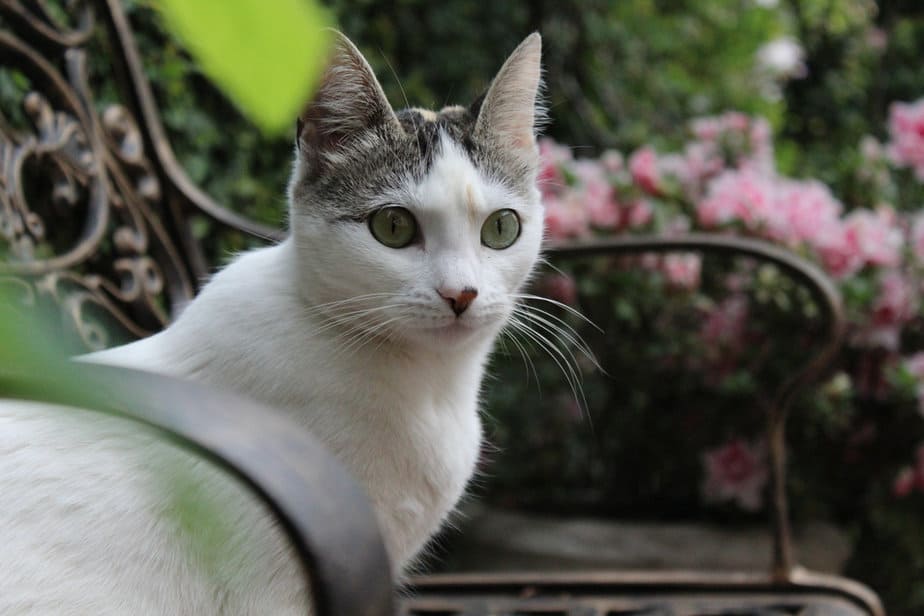
Flies are even better at providing your furry friend with her daily dose of minerals. Flies are packed with minerals such as iron, calcium, and magnesium. Minerals are great for maintaining your cat’s health and ensuring the quality of your cat’s life.
First things first, flies contain a small amount of iron that can help your cat whenever she’s feeling a bit deficient. She might have to eat a lot of flies to reap those benefits (the number of flies matters!), but she needs them for the benefit of her red blood cells.
On the other hand, calcium’s great for the strength and health of your cat’s muscles and bones. Cats that have a calcium deficiency might experience symptoms such as weakness, restlessness, twitching, tremors, and convulsions. Who would’ve thought that a couple of flies can help with that?!
And, we can’t forget about magnesium because it’s one of the essential minerals necessary for the proper function of your cat’s body. Magnesium’s great for ensuring the secretion of hormones, maintaining the health of teeth and bones, and supporting the proper enzyme function.
What are the risks of eating flies?
Cats can eat flies, but that doesn’t mean that you should go out of your way to provide your furry friend with these wiggly creatures.
Flies (as nutritious as they seem) don’t come without the risks of contracting numerous diseases, developing dangerous conditions, and experiencing digestive problems. Here are some things to consider (and ask your vet) before you decide to throw your four-legged friend a fly fiesta.
1. Pesticides and insecticides
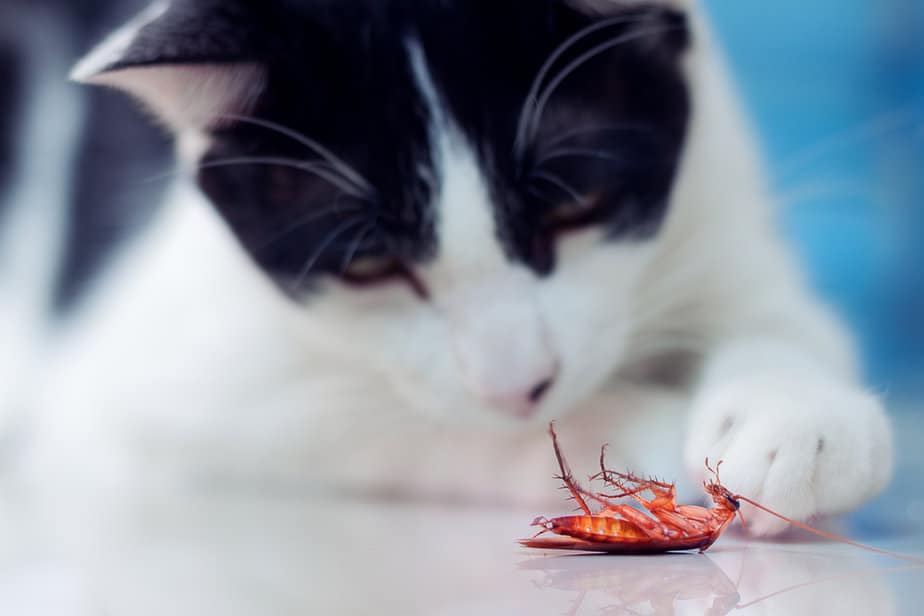
“Hmm, how can flies be the bearers of pesticides and insecticides? Wouldn’t they be dead, or at least appear less lively and wiggly?” When you’re considering the fact that you just learned cats can eat flies without repercussions, you might be overlooking these pesky passengers.
Think about this, when flies are flying around they’re resting their little feet on flowers and plants that may or may not contain pesticides. When they’re buzzing around and annoying everyone that gets in their way they might get sprayed with insecticides (and live to tell the story).
Then, they carry these pesticides and insecticides wherever they go. The ingestion of infected flies can cause a bunch of health problems to your cat because her digestive system can’t break down permethrin and similar poisons.
She might experience symptoms such as drooling, difficulty breathing, loss of coordination, weakness, loss of appetite, diarrhea, vomiting, tremors, and seizures. Severe cases can end with fatal results, so contact your vet THE VERY MOMENT you notice any of these symptoms.
2. Pathogens
Pathogens are organisms that carry disease. And, Pathogens of different kinds have been found within flies (feel free to check the list down below) and have been proven to have detrimental effects on your cat’s health.
Some of the most common pathogens are bacterial pathogens, Escherichia, Helicobacter, Salmonella, Staphylococcus, fungal pathogens, parasitic pathogens, Ascaris, and Giardia. These pathogens might sound like something out of a Harry Potter movie, but they’re fairly dangerous.
Eating fly eggs or fly larvae can have the same effects on your furry friend, so you might want to consider setting fly traps around the house. Flies might be great fun for your cat, but you can’t forget about the bacteria, parasites, and microbes.
3. Maggots
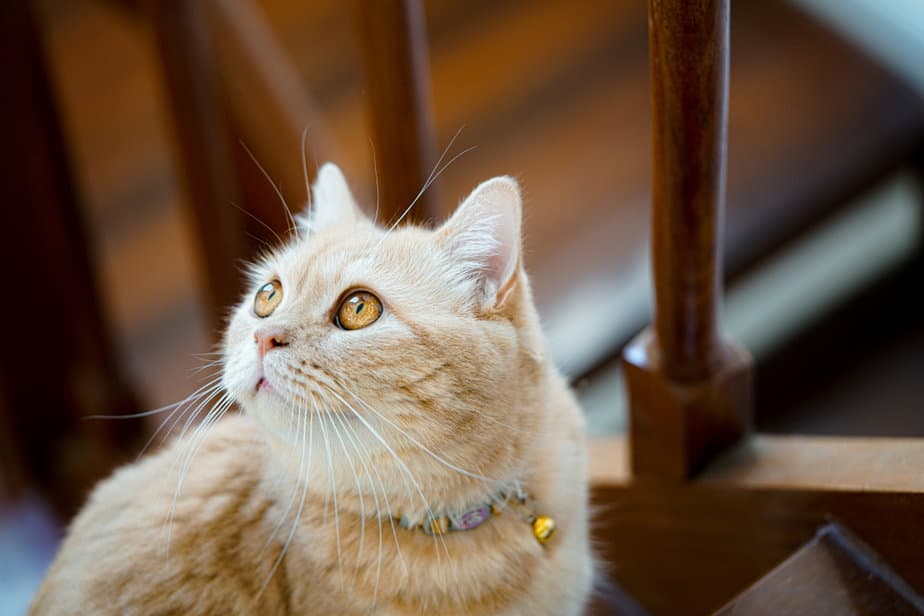
“So, can cats eat flies and not get worms?” To your cat’s disappointment, cats can get worms from eating or even playing with flies. Sure, that typically happens to cats with hygiene and health problems, festering wounds, and feces on the fur.
But, flies find a spot that works for them, give that spot a couple of bites, and lay eggs waiting for them to spread around, feed off the tissue, and develop into maggots. Maggots, tapeworms, and stomach worms (Physaloptera) are some of the worms that you can expect to see.
Some of the most common symptoms your cat might experience are anemia, anorexia, paleness of the gums, loss of coordination, loss of appetite, weakness, different sorts of skin and fur irritations, bloody scars and stools, and many more.
Contact your vet as soon as you notice any of these symptoms and make sure to get your cat the treatment she needs.
4. Digestive problems
Digestive problems seem like the least of your cat‘s concerns when you compare them to the rest of the risks, but they can be dangerous on their own. Cats can have sensitive stomachs – pair that with their neverending desire to scoff down everything they can get their paws on, and voilà.
Consuming TOO MANY flies can cause a bunch of digestive problems to your feline friend. Stomachache, diarrhea, constipation, and vomiting happen to be a couple of symptoms you might want to keep an eye out for.
Contact your vet the moment you notice any of these symptoms (now would be a good time for those fly traps, don‘t you think?). Cats can eat flies, but the only PROPER way of preventing these things from happening seems to be preventing your cat from eating flies.
How can you prevent your cat from eating flies?
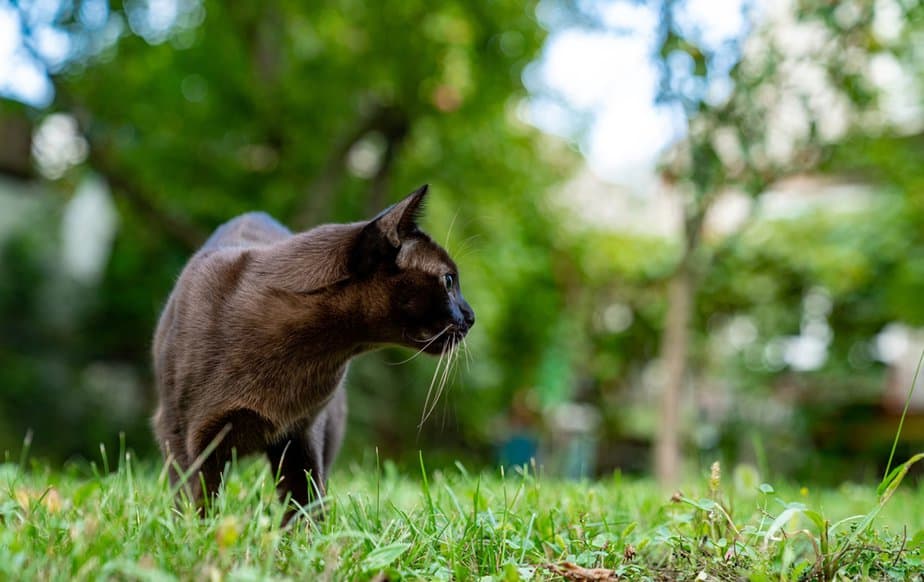
You can’t, but you can make things better with a couple of simple tricks.
Remember, a couple of flies here and there shouldn’t cause harm to your cat’s health. There’s no reason for you to go out of your way to remove every single fly out of your cat’s reach. There’s a reason why cats can eat flies and cats can play with flies.
But, to ensure your cat’s safety, you can try distracting her with toys when you notice she’s playing with WAY TOO MANY flies. She’s more than likely to devour every single one of them once she’s done teasing them. She’s better off being distracted with a fake mouse or a feather.
On the other hand, you can always try to feed her treats to show her there are better things for her to much on than flies. When you notice she’s running around the kitchen trying to catch a fly, whip out her favorite treat. Trust me, she’s going to leave that fly exactly where she found it.
Last but not least, you can chase away the fly before she can get to her. You can’t use insecticides around your furry friend, but you can open the door and politely ask the fly to leave (just joking!).
But, you can use a piece of paper to encourage the fly through an open window or through the door to a different room. You just need to get her out long enough for your cat to distract herself with something else, and voilà.
What other bugs can cats eat?
Now that you’re aware that cats can eat flies, you can’t help but wonder whether they can eat other bugs. Do you have to rush your feline friend to the emergency animal center every time she plays with a butterfly? Or chases a bee around the garden? Or pushes a spider?
You might have guessed this one yourself, but not every bug’s going to send your furry friend to the emergency animal center. Some bugs are safe and some bugs are a little less safe, and the worst that can happen when your cat eats a bug seem to be that they’re poisoned with pesticides and insecticides.
1. Butterflies
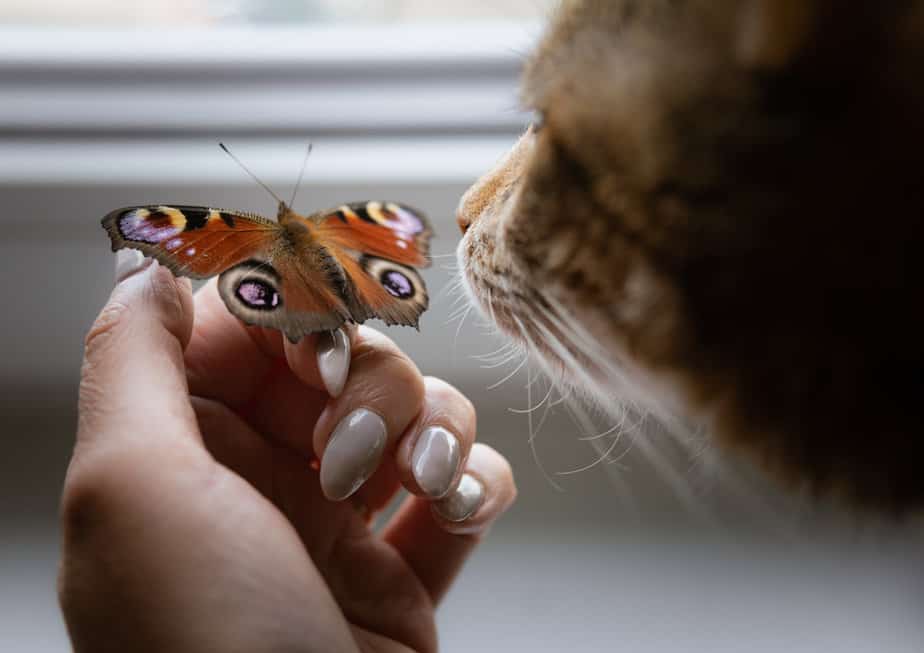
Cats ADORE pursuing butterflies whenever they have a chance. As a pet parent, you’ve probably witnessed your four-legged friend going crazy upon seeing a butterfly in the wild. And, you’ve probably seen her catching and chewing on a butterfly, too.
Cats can eat butterflies (and caterpillars) with pretty much no repercussions. Most butterflies are completely safe, while some caterpillars might sting and cause a little bit of pain. Most importantly, butterflies and caterpillars won’t cause lasting damage to your cat’s health.
2. Bees
Cats LOVE playing with buzzing bugs, and bees are pretty much the best out of the bunch. Wasps, bees, and other buzzing bugs might sting your cat and cause her some temporary pain, but that’s as bad as they can get. They won’t cause lasting damage to your cat (unless she’s allergic).
She’s more likely to lick the area where she was stung and cause irritations and infections (consult with your vet on that one), but that’s the worst-case scenario.
3. Spiders
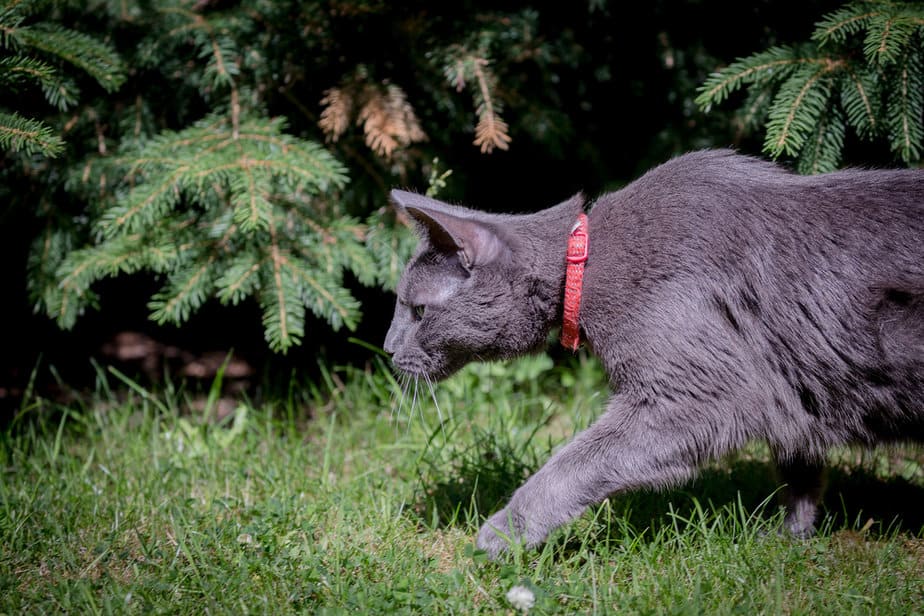
Small spiders (the ones you can see everywhere around your house) are pretty safe for your cat. They wiggle their way around the walls and tease your furry friend making her interested and intrigued. They’re safe even as a snack (as gross as that sounds).
But, we can’t forget about poisonous spiders which can cause harm to your cat’s health. Black widow spiders are especially dangerous because their poison’s toxic to cats. Brown Recluse and Hobo Spider come at a close second spot.
So, you might want to brush up on your spider knowledge to keep your cat happy, healthy, and SAFE.
What’s the conclusion? Can cats eat flies?
Cats can KIND OF eat flies, but there are a bunch of reasons why they shouldn’t. While an occasional fly or two shouldn‘t make your feline friend feel bad, anything more than that might send her to the emergency animal center (pesticides and insecticides, hello?!).
Get a fly trap and make sure your four-legged friend doesn’t go ham on these winged, wiggly bugs.
Read more: Can Cats Eat Moths? They Might Not Like Them Very “Moth”
